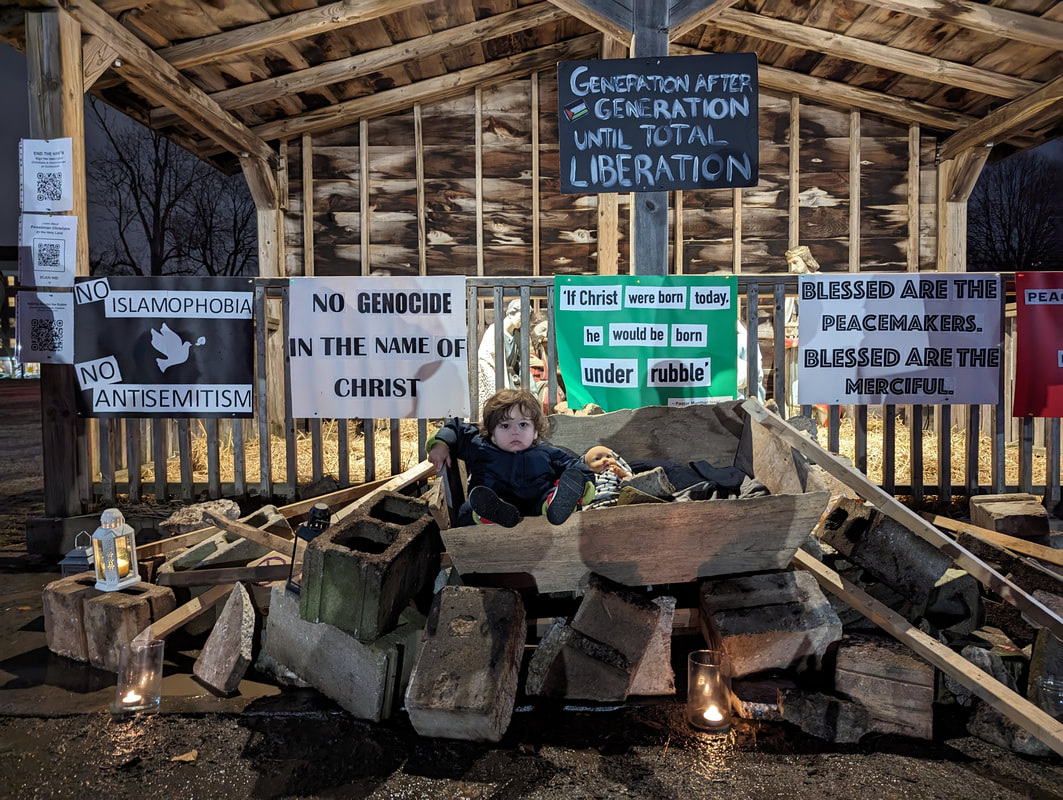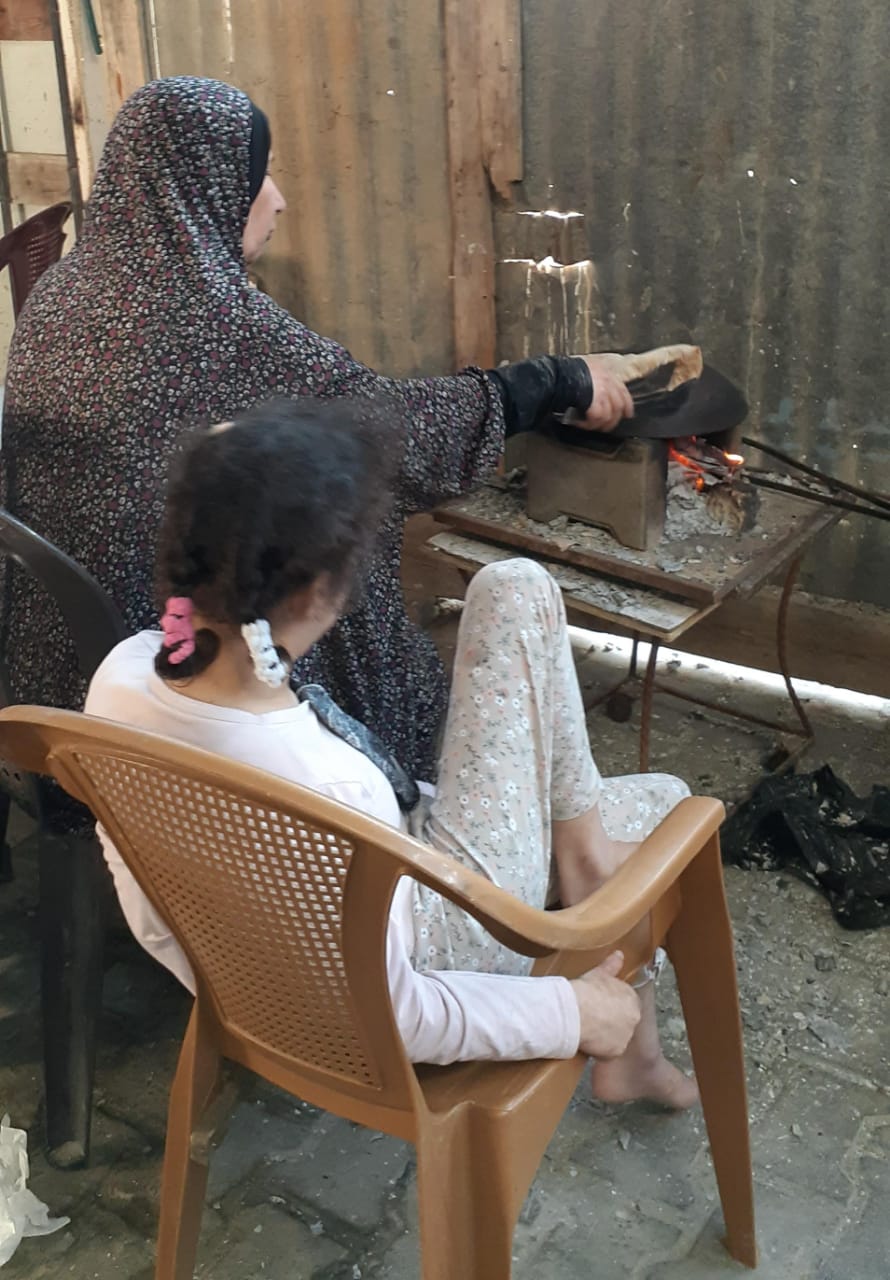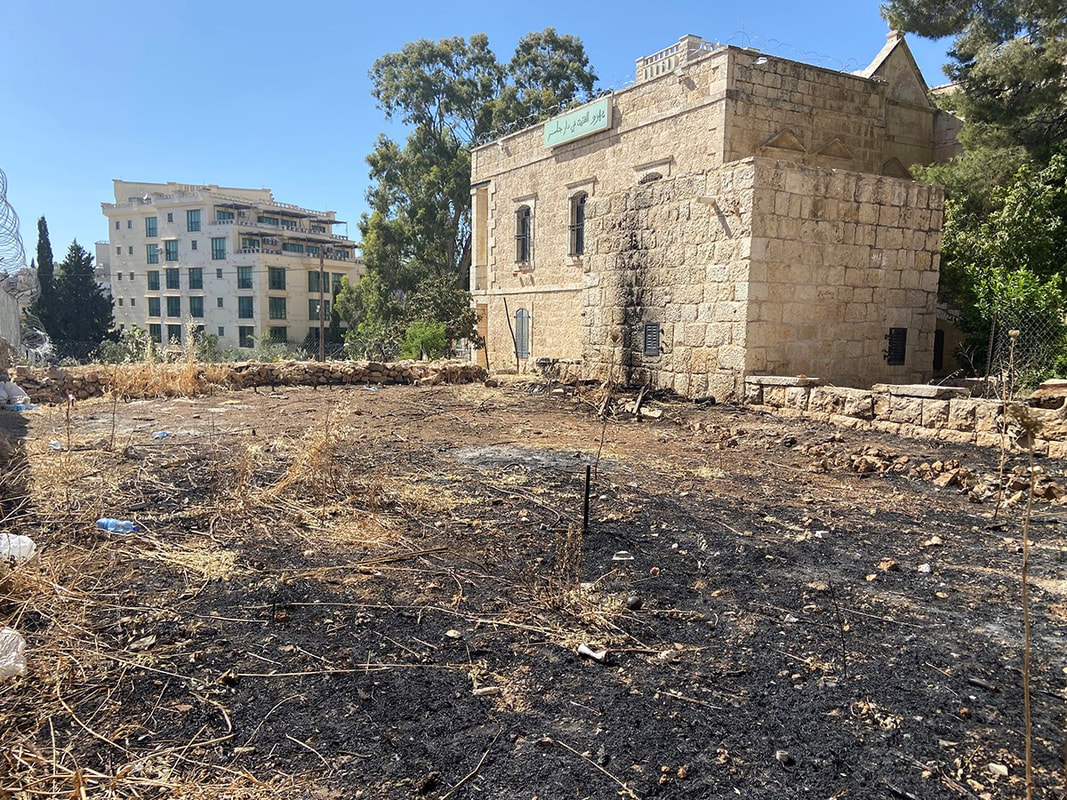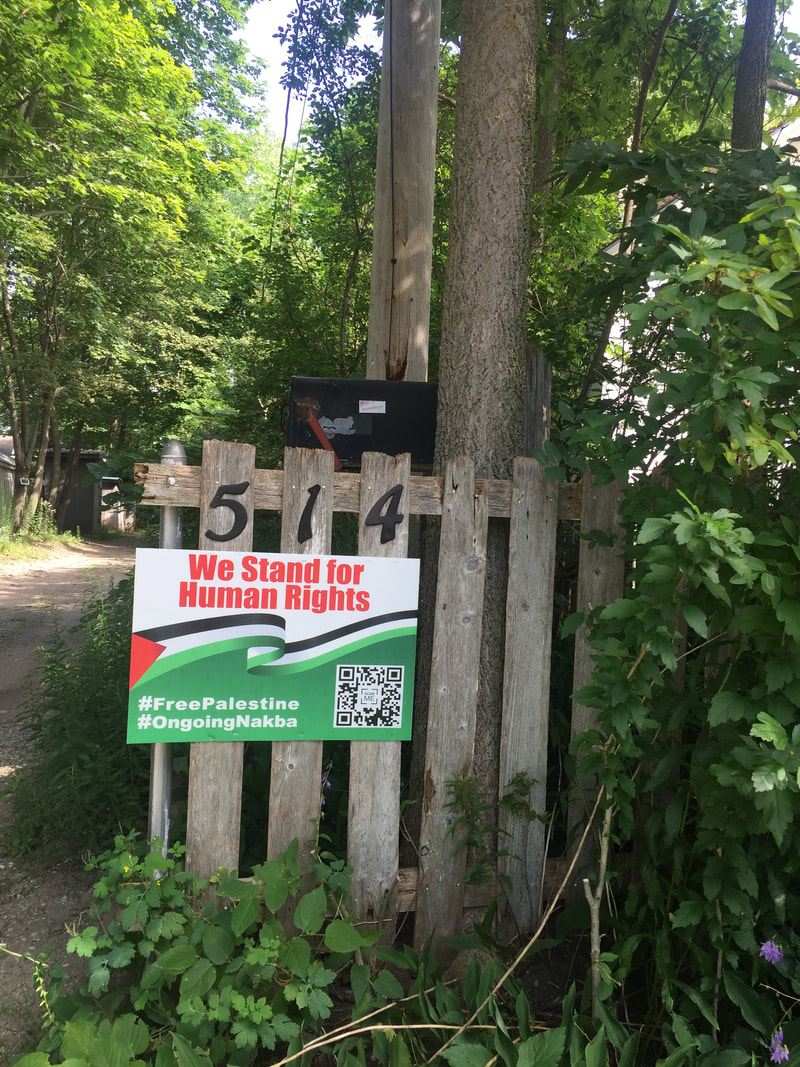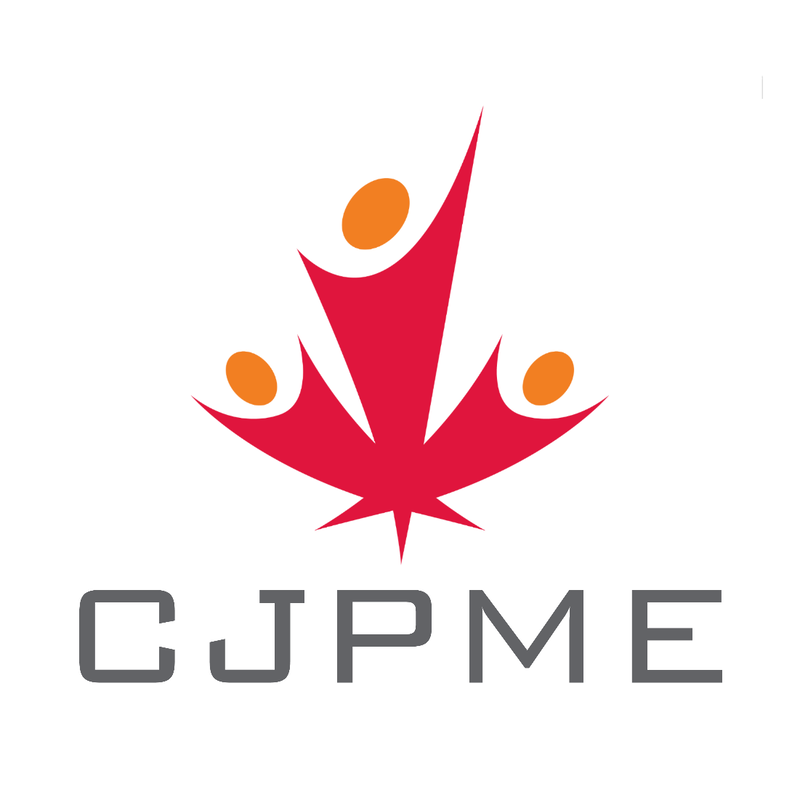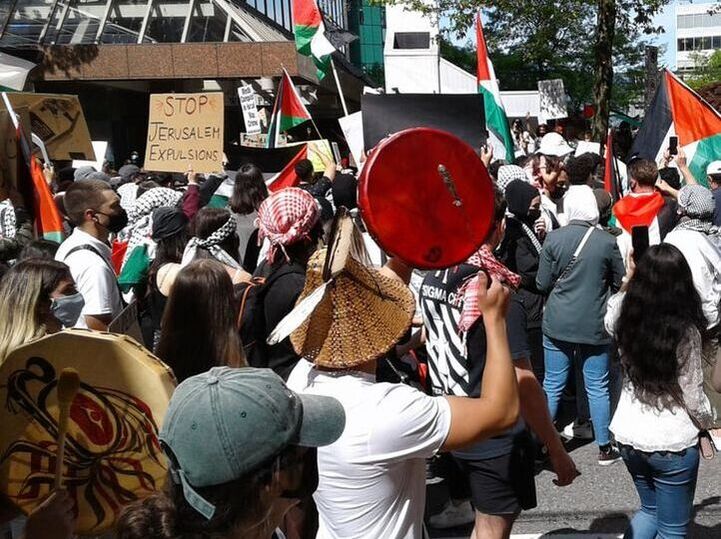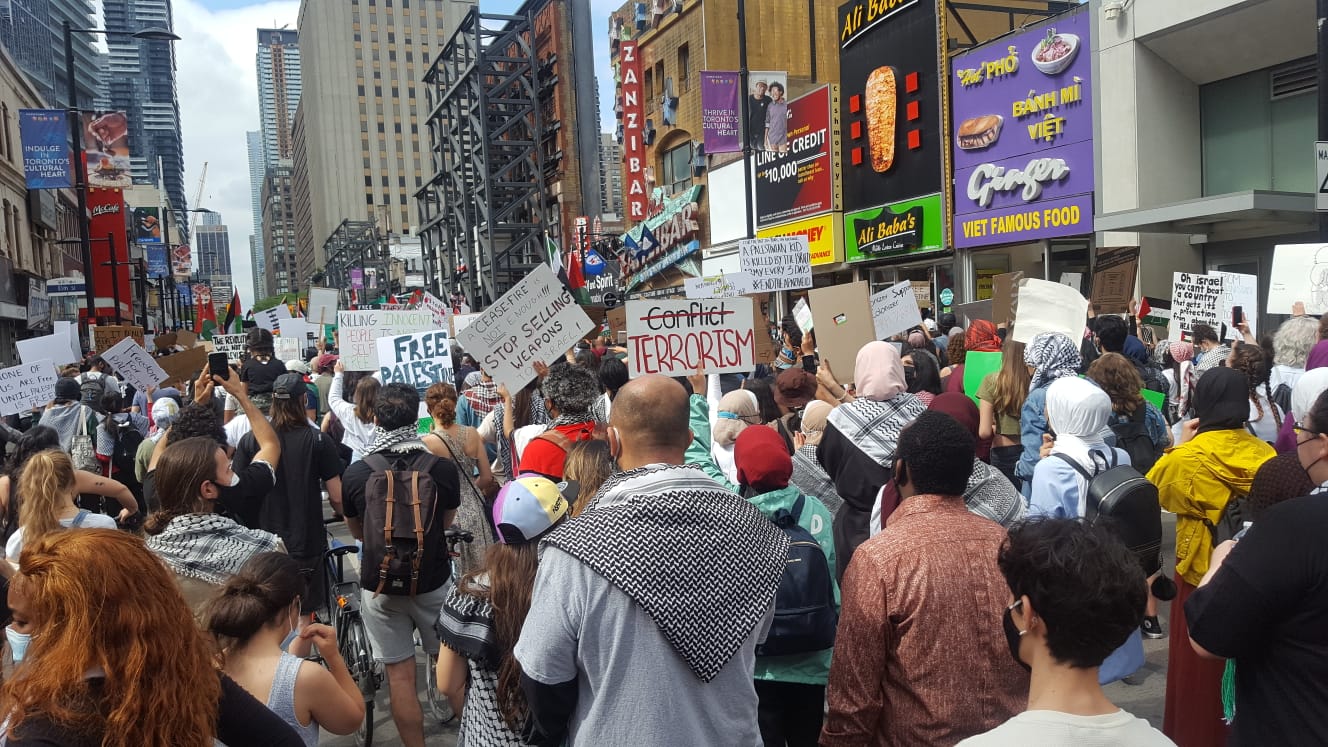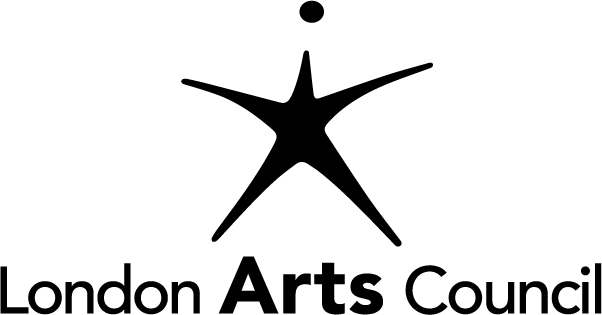RESPONSES FROM THE COMMUNITY
Statement from Chris Gittings, November 9, 2023
The horrors of Israeli violence in Gaza and the reluctance of some Western governments to speak out against war crimes is so dismaying. Netanyahu doesn't care about the Israeli people or the Palestinians, he just wants to remain in power, and as most newspaper columnists suggest—his aggressive, oppressive policies on Gaza have provoked this nightmare. I have no use for Islamic Jihad or the al-Quassam brigades and condemn the murderous atrocities they committed against Israeli civilians on 7 October, but Israel's disproportionate response, its murder of over 10, 000 Palestinians, and its political strategy of driving Palestinians out of Gaza and the West Bank territories to clear the way for violent, ultra-orthodox Israeli settlers is shameful and disgusting. It will be interesting to see what kind of response I receive when I teach 5 Broken Cameras to my students and provide a history of the Nakba and the ethnic cleansing of Palestinian villages that we now know did occur in 1948. Ceasefire now!
Diary Entry by Riwaa Abuquta - Living in War, October 19, 2023
On the evening of October 5th, my sister and I made a simple plan – to go for a walk every day. It was a way to break our routine, to escape from the confines of home. The weather was getting better, so we decided it was time for a change. We decided to start our walk from Rafah Beach, and head back home from there.
We'd opted for a Saturday morning walk, but the occupying forces had a different plan, one that disrupted not just that day, but all the days to come.
As the war began, we watched the news - homes destroyed, people killed, families forced to leave their homes, and people fleeing to the southern areas of Gaza. People rushed to the stores to get food and water. From the very first day, the power went out, fuel became scarce at gas stations, and generators stopped humming. Communication with many friends and acquaintances was lost. I couldn't check in on them.
The days went by, all feeling the same. Because I, along with my sisters, had been working from home, I lost my job because of the power outage and lack of internet. Nightfall brought fear as darkness fell. Our hearts raced with dread. The silence was eerie, and the sound of reconnaissance drones and Israeli army jets overhead terrified the children.
When the day broke, it meant more waiting for the many civilians trapped beneath the rubble. Some didn't make it, and some struggled for their lives. Time stood still for them. Every moment was like an eternity, especially for those under the rubble.
With daylight came loss, panic, and grim news. People had to retrieve bodies and remains, and funeral processions became a regular sight. There was hardly any time for mourning because it was an unending cycle of loss.
People rushed to secure clean water, to wash, to charge their phones, and to get bread for their families. Night comes again, and everyone is exhausted and drained from standing in long lines to secure their essentials. Each person is responsible for their family's needs.
This has been the story of the past 13 days, a story marked by hardship, fear, and loss.
Date: October 19, 2023
Today, I ventured outside after enduring 13 days of relentless aggression. Before the bombings and attacks, Gaza's streets were full of life. People went about their daily routines, kids played in the streets, and markets were lively with colorful fruits and vegetables. Families gathered at cafes, and you could hear the sounds of businesses and laughter in the air.
When school ended, the streets were crowded with students in their uniforms, chatting with friends, and carrying backpacks. It was a heartwarming sight that showed the community's resilience despite the challenges they faced. But on the 13th, going out was a harrowing experience. The journey was disheartening; the path was lined with buildings that had been reduced to rubble, a painful reminder of the devastation we've endured. My mission was a trip to the mall to secure some essential supplies.
As I entered, I was met with a bustling crowd, all with anxious faces, all in pursuit of the same basic necessities. It was impossible not to notice the children. Their innocence starkly contrasted with the harsh reality of the world around them. I couldn't help but feel immense sympathy for them, knowing that these days would leave indelible scars on their young hearts.
Parents, with their children in tow, attempted to soothe their fears with toys and distractions from the mall's shelves. It was evident that the terror that parents experience in times like these is immeasurable. A friend of mine even expressed a longing to face these hardships without children, believing that motherhood adds an extra layer of suffering as she constantly fears for her kids' safety.
The scenes of injured babies and children, their voices and their eyes, haunted me. They've been subjected to horrors that no child should ever endure, asking for their missing family members as they grapple with their trauma. These children are being forced to grow up too fast, robbed of their childhood.
I thought of my sister, Alaa, who is disabled. At the mere sound of warplanes and airstrikes, she trembles and repeats the sound she hears, "ddddd." It's a heart-wrenching reminder of the constant fear that has gripped us all. We surround her day and night, trying to provide some semblance of security.
Today, during my mall visit, I selected items to bring a moment of joy to Alaa, hoping she could momentarily forget the grim realities that surround us. Once we returned home, our focus shifted to ensuring she had enough medicine and diapers. Thankfully, we've managed to secure a sufficient supply, for the time being at least. We can only hope that this turmoil does not persist for much longer. The search for these necessities would be an additional burden, especially since her medicine is challenging to find in ordinary circumstances.
However, the disappointment came when I couldn't find milk and yogurt, which are essential for Alaa's food. It's a reminder of the harsh reality we're living, where even the most basic necessities have become elusive.
And as always, she has a strong need for comfort and reassurance. Alaa's sleep eludes her until one of us is by her side, offering a reassuring hug. It's a small gesture in a life marked by uncertainty and fear.
After more than five days of loss for our communication network and internet blackout, leaving us isolated from the outside world, I find myself revisiting the harrowing days of war. I had a moment of hesitation before writing, as if I could change the course of events with my words, but reality persists unchanged. Death and loss have visited us once more, taking away more loved ones from our lives.
For 13 consecutive days, our world has been plunged into darkness as electricity remains elusive. There's no gas for cooking, and we now prepare our meals over open flames, making do with whatever ingredients we can find. Bathing becomes an ordeal, filling buckets with ice-cold water as we suffer from power outages, we can't heat the water with a heater in this chilly autumn weather.
I snatch rare moments of internet access, only to be met with the names of friends and loved ones among the missing and the fallen. Each name etched between the lines, a poignant reminder of the heavy toll this conflict exacts on our lives.
Essay on Gaza by Riwaa Abuquta, October 16, 2023
We have received a range of responses from the community in regards to the ongoing catastrophe in Gaza, and are grateful to everyone that has reached out to share their concerns, critiques, and support. ECH received this statement by Riwaa Abuquta, a young writer from Gaza, who sent her statement to Deborah Root here in Canada.
From Deborah Root
October 17, 2023
Riwaa Abuquta is a 29-year-old writer in Gaza, living in Rafah along with her family. She became a writing mentee a few years ago and we've since become friends, staying in regular touch. We’ve continued to speak over the last few days, via What’sApp (when she’s able to get a signal). Conditions are increasingly dire, with some people trying to desalinate water by soaking potato pieces to draw out the salt (it doesn't work). She wrote in a message: "Every morning we get up feeling like we're drowning." Yesterday Riwaa asked me what people in Canada are saying about Gaza, so I sent her the October 16 ECH statement. That ECH statement is giving her and others in Rafah the hope that they are not as alone as they feel in the midst of the siege. Last night she wrote her own statement, an amended version of her Facebook post of October 12, editing the piece through the sound of falling bombs. She asked me to pass it along to ECH, so we can understand how someone on the ground in Gaza is thinking. For Riwaa, writing is a way of giving, and of communicating with people outside Gaza as she does her best to survive.
Essay on Gaza by Riwaa Abuquta
October 16, 2023
As we mourn, we are committed to educating and raising awareness about our challenges.
What would happen if you built a refuge for persecuted people in a place where other people already live?
In the next few minutes, you'll understand why this moral dilemma lies at the root of the struggle. The moral dilemma of building a refuge for persecuted people in an already inhabited place leads to conflicts like the Israeli-Palestinian situation. In this case, the foundation of Israel as a Jewish state resulted in the displacement of indigenous Palestinians. The conflict continues today with millions of Palestinian refugees longing to return to their homeland.
Historical Overview
Many Jews fled harsh persecution in anti-Semitic Europe, notably during the Nazi Holocaust. Zionists encouraged massive immigration to Palestine, at that time a British colony where Jews had an age-old connection and where small Jewish communities had long existed among larger groups of other indigenous peoples. When the UN offered the Jewish immigrants the majority of the land for a new state called Israel, for the indigenous Palestinians who already lived there, it was the massive destruction of life. They rejected the UN's partition plan, and several Arab states invaded the newly established Israel. By the end of the struggle, Israeli forces had erased over 400 Palestinian villages and towns. Israel controlled 78% of Palestine.
When over three-quarters of a million Palestinians who fled or were expelled during the fighting tried to return to their homes, the Israelis permanently barred them. Over 100,000 of their relatives and neighbors who had not left became second-class citizens of the new state called Israel, alongside the new Jewish majority. Today, the number of Palestinian refugees and their descendants is in the millions, with most residing in the Gaza Strip, the West Bank, and Jordan. Many are dispersed across the world, with millions still living in refugee camps, longing to return to their homeland. To sum up, while one group of Zionists founded their home as they claim, in the process, a new group of refugees was created.
Now, here's the second thing to understand:
The Vision of Palestine
Israel was founded as a Jewish state, but now ask yourself! What exactly does that mean? People had lots of ideas about what a Jewish state should look like. Some called for equality for all citizens, but what was created in practice was institutional discrimination against non-Jews. In other words, Israel ended up being built on a blueprint of exclusion; the Israeli government wants maximum land and resources for Jews but not the Palestinians living already there. That's why inside occupied Palestinian lands, Jews get special privileges including rights to land and housing that are denied to the Palestinian citizens who already live there. This exclusionary blueprint also led Israel to avoid defining its borders. It continues to hold on to the West Bank and Gaza, occupied in the 1967 war. Since then, Israel has built Jewish settlements throughout the occupied West Bank, building Jewish-only cities and supplying them with infrastructure like; roads, army camps, schools, and colleges.
Military occupations are meant to be temporary, yet after over 70 years, this one appears permanent and unjust. In the West Bank, Israeli Jewish settlers and Palestinians share the same land but live under two entirely separate and unequal systems of Israeli law. Jewish settlers dominate natural resources, such as water and agricultural land, with the support of the Israeli army, while Palestinians experience the demolition of homes, land confiscation, and subjugation in Gaza. Resistance is met with raids, arrests, and assassinations, all aimed at; expanding land while making life so difficult for Palestinians that they will either leave or be too afraid to resist.
Palestinian Resistance and the Quest for Peace
Palestinians have fought back for decades, they tried to achieve national liberation through armed struggle. Some support popular protest instead of fighting and see this cycle of control, repression, and violence deeply harmful to Palestinians living under occupation. To reach a peaceful and secure future for us as Palestinians, they want this cycle to be broken.
Now that we have explored the problem, what about the solution, What about peace talks!
So far, over two decades of US-backed peace talks have actually made things worse by supporting Israel to continue the occupation. It's been years of talking while Israel massively expanded the Jewish settlements and literally redrew the map. Peace talks are good if they're real, but not when they're a theatre to cover land confiscation.
So, what's next?
The United States has been a terrible friend, enabling Israel's expansion onto Palestinian land by funding the Israeli military—the world's largest recipient of US foreign aid.
However, there's another superpower that can make a difference—You. Hundreds of thousands worldwide are engaging in protests, education, divestment, and boycotts.
Gaza's Humanitarian Crisis
Since the 7th of October, a dire situation has engulfed the people of Gaza. The region has been plunged into darkness as electricity remains cut off, making daily life an arduous challenge. Access to the internet is limited, water is scarce, and life-saving supplements are out of reach. Amidst this grim reality, a mass evacuation has been initiated, with many from the northern areas seeking refuge in the south. The streets have become makeshift bedrooms for countless families, exposed to the ever-changing weather conditions. What makes this ordeal even more heart-wrenching is that most of these displaced individuals have no relatives in the south to turn to for support.
Schools, now overflowing with people seeking shelter, offer a meager six bathrooms each, an unimaginable predicament given the sheer number of occupants. In these cramped spaces, men, women, elderly citizens, children, pregnant women, and the sick all share these facilities. Adding to the misery, there is no water or electricity in these overcrowded sanctuaries, and food is in short supply. Despite the adversity, there is a glimmer of hope as people rally to help one another. Neighbors and communities surrounding the schools are pooling their resources, scraping together money and food to provide nourishment for those in need. Certainly, it's impossible to fathom the situation in the coming days. The uncertainty and challenges continue to mount. In the face of these hardships, people are displaying remarkable resilience and solidarity. They're sharing whatever little they have with one another, whether it's food, water, or any available resources. However, as the supplies deplete, the situation becomes even more critical. When the limited resources are exhausted, and desperation deepens, the community comes together with a collective plea for help.
It's a heart-wrenching reality where the people of Gaza find strength in unity, knowing that their survival depends on the compassion and assistance of others. In previous attacks, the UNRWA (United Nations Relief and Works Agency for Palestine Refugees) had taken control of the situation and provided assistance, but this time, their resources are severely constrained, leaving the people of Gaza more vulnerable than ever. The struggle for basic necessities has become a daily battle. Families must spend entire days searching for water, even finding just a small gallon is a victory. In previous conflicts, aid and support arrived quickly once hostilities commenced, but this time, it seems that the flow of assistance has been stifled, leaving the people of Gaza in a precarious and dire situation.
Your Contribution
Please try to educate yourselves before posting/sharing viewpoints or being "Pro-peace." While advocating for peace is a universal desire, it is crucial to recognize that everyone shares this aspiration. It does not require an exceptional level of insight. However, it is vital not to engage in discussions without a comprehensive understanding of the matter at hand. The primary aim should be to enlighten the global community about the historical context and the events that have unfolded over the past seven and a half decades.
Don't stay silent or neutral.
Plan to keep reading and continue to educate yourself as well before making statements. Concerns about potential limitations imposed by social media algorithms, the possibility of posts being restricted, or the risk of losing followers should not dissuade individuals from voicing their support for the Palestinian cause. The paramount goal is to raise awareness and disseminate knowledge about the historical injustices that have been inflicted upon the Palestinian people for decades. These collective efforts are aimed at exerting international pressure to address and rectify the severe human rights violations that Palestinians experience. The ultimate aim is to advocate for justice and a lasting resolution to halt human rights violations against Palestinians.
Statement on Palestine/Israel: October 16, 2023
As the crisis in Gaza rapidly deteriorates, we condemn the ongoing violence against innocent Palestinians in Gaza and the occupied West Bank, including East Jerusalem.
From Jewish Voice for Peace, comes this alarming news; “In the past week, Israel has dropped more bombs on Gaza than the U.S. did in a year of war on Afghanistan." The continued siege of Gaza and the withholding of food, water, electricity, and humanitarian aid is in total violation of international law. These acts amount to an imminent genocide that must be stopped.
We stand in solidarity with the people of Gaza.
We stand in solidarity with the people of Palestine.
We continue to receive news on this issue and we would like to highlight this statement from Dar Yusuf Nasri Jacir for Art and Research, a grass-roots independent artist–run initiative based in Bethlehem:
Vigils, marches and protests are taking place on our street on a daily basis which are met with violent aggression incurred by Israel’s army and their war machines. Our space has sustained damages as a result of this. We have secured Dar Jacir for the time being and remain off-site. The situation in the West Bank remains under lockdown, with Israeli incursions nightly, and settlers roaming around armed and killing innocent people.
At this time all the focus and solidarity must be with Gaza. We urge you all to support Gaza. For those asking for trusted organizations to support our people in Gaza, we recommend looking through this list.
and these poignant lines by Palestinian poet, Mahmoud Darwish (1941-2008):
Where should we go after the last frontiers?
Where should the birds fly after the last sky?
(From “The Earth is Closing On Us")
We encourage further reading to give context to this catastrophe:
- From Yumna Patel and Mondoweiss Palestine Bureau at Mondoweiss: “'Operation Al-Aqsa Flood' Day 9: Water is running out in Gaza, Israel continues to prevent humanitarian aid"
- From Faisal Bhabha, Faisal Kutty, Muneeza Sheikh, contributors to Toronto Star: “The right side of Mideast crisis is that of humanity and international humanitarian law"
- From Canadians for Justice and Peace in the Middle East (CJPME): “Responding to Misinformation and Hatred"
- From Jewish Voice for Peace: “Jewish Voice for Peace calls on all people of conscience to stop imminent genocide"
- From Al Jazeera: “Which countries have criticised Israeli attacks on Gaza?"
- From Friends of Sabeel North America: “Statement from the Sabeel Ecumenical Palestinian Liberation Theology Centre"
- From Jewish Voice for Peace: “Genocide, ethnic cleansing, and another Nakba in Palestine"
- From On Canada Project: “Israel's apartheid against Palestinians is a crime against humanity"
Statement on Palestine/Israel: October 13, 2023
The Embassy Cultural House expresses our profound grief as we mourn so many lives that have been lost since Hamas launched its horrific attack on Israel on Saturday October 7, 2023, which led to the massacre of Israeli civilians, and the kidnapping of hostages. Israel's subsequent retaliation on Gaza, has also led to the killing of innocent Palestinian civilians.
The magnitude of Israel’s devastating response and the impact of this war on both populations, including innocent children being killed and injured, will have lasting consequences. Both Israeli and Palestinian innocent lives have been lost to this senseless violence in this latest conflict.
We hope for an immediate release of the hostages held by Hamas and a ceasefire, so that a dialogue can begin towards establishing peace and stability for all those affected by this conflict both on the ground and those who are further away.
Please consider giving to the Canadian Red Cross efforts to provide humanitarian assistance to those affected by the violence: Israel and Occupied Palestinian Territories - Canadian Red Cross
In the words of Francesca P. Albanese, United Nations’ Special Rapporteur on the Occupied Palestinian Territory:
“I am profoundly convinced that while we cannot turn the clock back and make fully right the wrongs punctuating the past of that tormented part of the world that we learn to call Israel/Palestine, there is a just way out." - “Protecting Human Rights in Occupied Palestine: Working Through the United Nations", Richard Falk, John Dugard, Michael Lynk, 2022
From Maya Pontone at Hyperallergic, “After Hamas Assault, Israeli Strikes Destroy Mosques and Buildings in Gaza."
Statement on Dar Yusuf Nasri Jacir, May 15th, 2021
As an artist-run project, the ECH condemns the May 15th unjustified ransacking and raid by Israeli Defense Force soldiers on Dar Yusuf Nasri Jacir for Art & Research, an independent art centre in Bethlehem.
The raid, which destroyed computers and other office equipment, follows the burning of their urban farm earlier in the week. Attacks against cultural centres and other civil society organizations, including the media, are against international law.
The ECH is appalled by the recent violence, rising tensions, and the devastating loss of life in Palestine and Israel. The toll —particularly on civilians, including women and children — has already been far too great. Join us in solidarity with all those who support a just peace in the Middle East.
Members from our ECH community participated in pro-Palestinian rallies across Canada against the recent violence. This page is a response to the current crisis, but also firm support for the self-determination of the Palestinian people. We recognize the right of the State of Palestine to exist, irrespective of those who seek to deny and veto Palestine international recognition. In the face of this intransience Palestinian land continues to be annexed and expropriated in violation of international law.
The Embassy Cultural House is a proud supporter of
|
|
ECH represented in solidarity with Palestine from unceded Coast Salish territories of the xʷməθkʷəy̓əm, Sḵwx̱wú7mesh, and səl̓ílwətaʔɬ nations, May 15th Nakba Day, 2021.
Photo credit: SF Ho |
ECH represented at the Pro-Palestinian protest in Toronto, Ontario, May 22, 2021. Photo credit: Andreas Buchwaldt
|
